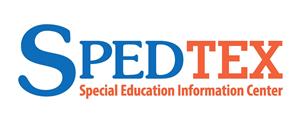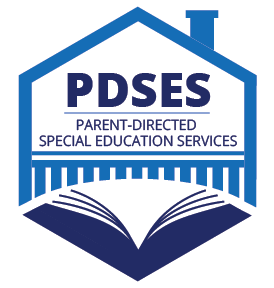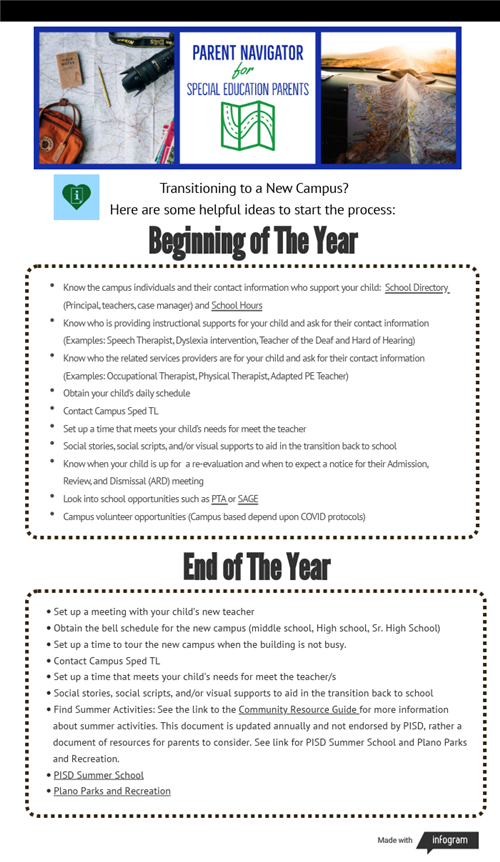- Academics at Plano ISD
- Parent Navigator
Parent Navigator
-

Plano ISD Student Support Services Department Mission
Plano ISD Student Support Services Department will provide a full continuum of services and supports in order to educate, inspire, and empower every student to achieve their unique potential in a dynamic world.
This is a site to support parents with students in Special Education.
Events and Announcements
-
Resources:
- Transition Planning Resources for Families (SpedTx)
- Families New to Special Education (SpedTx)
-
Description: The Special Education Information Center (SPEDTex) provides resources and interactive features for increasing family awareness of disabilities and special education processes, with the goal of improving partnerships between schools and families.
Contact information:
Phone: 1-855-773-3839
Email: inquire@spedtex.org
- Partners Resource Network PACT Project
- Child Find Public Awareness
- Transition Connection (Newsletter from Texas Workforce)
- LifePath Systems would like to invite your student to participate in a grant project they have received from the Administration for Community Living. The grant project, called Building My Future is designed to increase the number of youths with intellectual and developmental disabilities who achieve successful outcomes of their choosing regarding employment, education, and independent living. Participants will be provided:
- Assistance with connecting to Texas Workforce Vocational Rehabilitation Services
- A digital portfolio that can be shared with their circle of support
- Peer mentoring
- Career and post-secondary exploration and preparation
- Family information nights
- link to flyer
 Texas Autism Resource Guide for Effective Teaching
Texas Autism Resource Guide for Effective TeachingTexas Transition and Employment Guide
- Partners Resouce Network Statewide Webinars
 Think College Search features 309 colleges and universities that offer postsecondary education programs for students with intellectual disability. Users of this searchable online database can filter by state, length of the program, type of school, options for living on campus, and more. Click HERE to view.
Think College Search features 309 colleges and universities that offer postsecondary education programs for students with intellectual disability. Users of this searchable online database can filter by state, length of the program, type of school, options for living on campus, and more. Click HERE to view.
-
Important for all Families
This section includes important resources that are considered to be "top of the list things do to."
Important for all Families
-
Texas Education Agency (TEA)- Resources
-
Updates in Special Education
Updates
In 2019, the 86th Texas Legislature passed Senate Bill 139 (SB 139), which requires Texas local education agencies (LEAs) to distribute the updates in special education at: https://tea.texas.gov/sites/default/files/Updates-on-Special-Education.pdf
Additional notices are available at http://direc.to/dVYo regarding:
Compensatory Services
TEA developed a document to assist parents whose children may have been previously delayed or denied an evaluation under IDEA, in requesting compensatory services for their child.
OSEP Compensatory Services Notification Requirement (English/Espanol)
-
Actualizaciones en Educación Especial
En el año 2019, la 86a Asamblea Legislativa de Texas aprobó el Proyecto de Ley del Senado 139 (Senate Bill, o SB, 139), que exige a todas las agencias de educación locales de Texas distribuir a todos los padres el aviso a continuación.
Aviso para padres en español https://tea.texas.gov/sites/default/files/updates-on-special-education-spanish.pdf
Por favor, lea el aviso y luego haga clic en http://direc.to/dVYo para leer los cuatro avisos adicionales proporcionados:
-
Parent-Directed Special Education Services (PDSES)
Parent-Directed Special Education Services (PDSES)
Parent-Directed Special Education Services (PDSES) The Parent-Directed Special Education Services (PDSES) program is a one-time $1,500 online grant for parents/guardians of eligible students served by special education and who are enrolled in a Texas public school. Parents/guardians of eligible students can use the online accounts to shop the marketplace to obtain educational materials and resources such as textbooks, curriculum, or technology devices and/or services such as additional speech therapy, tutoring, or other specific services. The PDSES program is the same as the Supplemental Special Education Services (SSES) program, just with a new name to better reflect the importance of parents as decision makers in the educational process. The same students who were eligible for the SSES program are eligible for the PDSES program. If students already received an SSES grant, they will not be eligible for a PDSES program grant.
The PDSES Program is a first-come, first-served one-time only grant. If you have previously been awarded a PDSES or SSES account, you will not be eligible to apply again. Before you apply, please make sure your student meets the eligibility criteria.
To be eligible for the PDSES grant, a student must:
- be currently enrolled in a Texas public school (grades Pre-K through 12th);
- receive special education services through an individualized education program (IEP); and
- have not received a PDSES/SSES grant in the past. (PDSES is a one-time-only grant.)
Servicios de Educación Especial Dirigidos por los Padres (PDSES por sus siglas en inglés)
El programa de Servicios de Educación Especial Dirigidos por los Padres (PDSES, por sus siglas en inglés), es una subvención única en línea de $1,500 para padres/tutores de estudiantes elegibles atendidos por educación especial y que están inscritos en una escuela pública de Texas. Los padres/tutores de los estudiantes elegibles pueden usar las cuentas en línea para comprar en el mercado y obtener materiales y recursos educativos como libros de texto, currículo o dispositivos y/o servicios tecnológicos como terapia del habla adicional, tutoría u otros servicios específicos. El programa PDSES es el mismo que el programa Servicios Suplementarios de Educación Especial (SSES), solo que con un nuevo nombre para reflejar mejor la importancia de los padres como tomadores de decisiones en el proceso educativo. Los mismos estudiantes que eran elegibles para el programa SSES son elegibles para el programa PDSES. Si los estudiantes ya recibieron una beca de SSES, no serán elegibles para una beca del programa PDSES.
Criterios de elegibilidad:
El Programa PDSES es una subvención única por orden de llegada. Si anteriormente se le había otorgado una cuenta PDSES o SSES, no será elegible para volver a solicitarla. Antes de presentar la solicitud, asegúrese de que su estudiante cumpla con los criterios de elegibilidad.
Para ser elegible para la beca PDSES, un estudiante debe:
- estar actualmente inscrito en una escuela pública de Texas (grados Pre-K a 12);
- recibir servicios de educación especial a través de un programa de educación individualizado (IEP, por sus siglas en inglés); y
- no haber recibido una subvención PDSES/SSES en el pasado. (PDSES es una subvención de una sola vez).
Update April 2025:
The 2024-2025 PDSES application is closed.
The 2025-2026 application window will open in the Spring of 2026, please check back here for specific dates or you can sign up for PDSES email updates.
La solicitud de PDSES para el año escolar 2024-2025 está cerrada.
El plazo de solicitud para 2025-2026 se abrirá en la primavera de 2026, vuelva aquí para conocer las fechas específicas o puede inscribirse para recibir actualizaciones por correo electrónico de PDSES.
-
Plano ISD District Calendar
-
LifePath Systems (For Collin County Residents)
LifePath Systems To be placed on the Interest List, call Lifepath Services at 972-562-0190 or the Department of Human Services at 512-438-5658
-
Metrocare (For Dallas County Residents)
Metrocare (For Dallas County Residents) To be placed on the Interest List call Inquiry Line: (866) 501-6535
-
SPEDTex
Description: The Special Education Information Center (SPEDTex) provides resources and interactive features for increasing family awareness of disabilities and special education processes, with the goal of improving partnerships between schools and families.
Contact information:
Phone: 1-855-773-3839
Email: inquire@spedtex.org
-
Medicaid Waivers
- SPED TEX: Texas Medicaid Waiver Programs for Children with Disabilities
-
With the following information shared by Navigate Life Texas, a project supported by Texas Health and Human Services, you can learn more about Medicaid waiver programs for children, including an overview of services and eligibility. Click here.
-
-
SPED TEX: Resources and Help Available: Get on the Waiting Lists Now
-
Find out why it’s important to be on waiting lists for resources early in your child’s life in this video from Texas Complex Access Network. Click here.
-
Planning for the Future with Medicaid Waivers
- SPED TEX: Texas Medicaid Waiver Programs for Children with Disabilities
-
Plano Police Department
-
Digital Resources
Below are recordings and presentations that Special Education has provided for Parents/Families. The recordings are organized based on the event they were presented at.
Digital Resources
-
2024-2025 Trainings/Webinars
Workshop Series- Local Agency LifePath Systems (video) - 1/14/25
Workshop Series - SSI & Employment (video) - 2/4/25
-
2023-2024 Trainings/Webinars
Workshop Series- REACH/Kingdom Performance (Video) 9/5/2023
Workshop Series- Guardianship (Video) 10/3/2023
Project SEARCH (Video) 11/14/2023
Disability Rights Texas (Video) 12/05/2023
Transition to College-Workshop Series (Video) 2/7/2024
Think College (Video) 3/6/2024
Let's Talk: The Dignity of Risk and Transition (Video) 4/2/2024
-
2022-2023 Trainings/Webinars
-
2021-2022 Trainings/Webinars
Transitioning to College (2/8/2022):
- To access the video above please click download.
Let's Talk Special Needs Planning: Wills, Special Needs Trusts, ABLE Accounts (4/5/2022)
-

General Information
The sections below provide information regarding special education contact lists, acronyms, evaluations, IDEA, and more. There are also sections that include information you may need in regard to a particular time of year.
General Information
-
What is an IEP?
Below is a link to a Texas Education Agency Resource about Individualized Education Program (IEP).
-
General Information
Acronyms: Special Education seems to have a language of its own. Educators often use many of these words in conversations with parents, so, as a parent, please ask for clarification or an explanation of the meaning. Additional link for Acronyms and Abbreviations.
IDEA Individuals with Disabilities Education Act website. Texas Education Agency (TEA) fact sheet for IDEA.
Special Education Contact List: Linked is the PISD Special Education contact list.
Special Education Home Page: This link will navigate you to the PISD Special Education website.
Texas Council of Developmental Disabilities: "The Texas Council for Developmental Disabilities helps people with developmental disabilities achieve their potential for independence, productivity, and integration into their communities by working to develop a comprehensive system of service and supports in Texas."(Texas Council of Developmental Disabilities)
Resolving Student and Parent Concerns: Plano ISD encourages students and parents to attempt to resolve their concerns with the appropriate teacher, principal, other campus administrators, department, or employee. The district believes it is in the best interest of everyone involved to informally resolve concerns, if at all possible. Concerns should be expressed as soon as possible to allow early resolution at the lowest possible administrative level.
Technical Assistance: Child Find and Evaluation: Link to a PDF developed by the Texas Education Agency (TEA)
Technical Assistance: Individualized Education Program (IEP) Development: Link to a PDF developed by the Texas Education Agency (TEA)
Evaluations
-
Evaluations
Evaluations: This link will navigate you to the PISD special education site for more information regarding the evaluation process.
Partners Resource Network: Evaluation and IEP Timelines
Beginning of the year
-
Beginning of the Year
End of the Year
-
End of the Year
End of the Year Helpful Links:
Summer activities:
See Community Resource Guide for more information about summer activities. This document is updated annually and not endorsed by PISD, rather a document of resources for parents to consider.
-

Resources
The resource section provides links for special education, program, and community resources.
Resources
-
General Resources
Center for Parent Information & Resources
Contacts for College Programs for Students with Disabilities 2021
Council of Learning Disabilities
Council for Exceptional Children (CEC)
Special Education Rules & Regulations
Specially Designed Instruction (SDI)
SPED TEX- Special Education Information Center
Special Education in Texas A-Z Index
The Legal Framework for the Child-Centered Special Education Process
-
Attention-Deficit/Hyperactivity Disorder (ADHD)
-
Behavior Supports
Positive Behavior Supports || A Resource Collection
Positive Behavioral Interventions and Supports (PBIS): Supporting Families with PBIS at Home
Technical Assistance: Behavior Supports and Guidance for Students with Disabilities
-
Community Resource Guide
Community Resource Guide: This document is updated annually and not endorsed by PISD, rather a document of resources for parents to consider.
-
Deaf and Hard of Hearing Resources
-
Down Syndrome
-
ECI/ECSE
-
Learning Disabilities
-
Summer Resources
The links below are not endorsed by PISD, but rather a list of resources for parents to consider.
City of Plano Parks and Rec CatalogCommunity Resource Guide: This document is updated annually and not endorsed by PISD, but rather a document of resources for parents to consider.
-
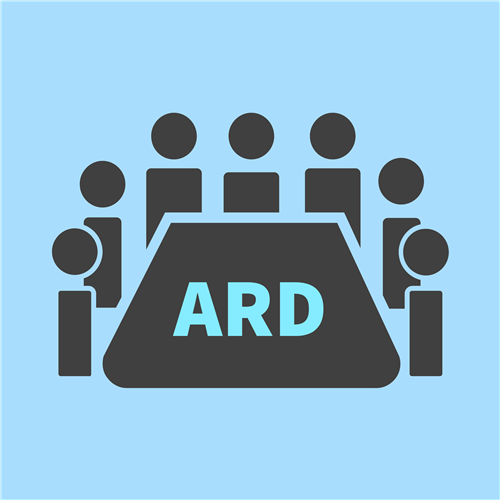
ARD Process
In the Admission, Review and Dismissal (ARD) Process sections you will find links to provide further information about the ARD and Individualized Education Plan (IEP) processes such as the ARD guide and procedural safeguards.
ARD Process
-
Admission Review, and Dismissal Process (ARD)
Parent's Guide to the Admission, Review, and Dismissal Process: "The guide is designed to give you, as the parent of a child who is or may be eligible for special education services, a better understanding of the special education
process..." -
Procedural Safeguards
Procedural Safeguards (English): Rights of Parents of Children with Disabilities
Procedural Safeguards (Spanish)
Procedural Safeguards (more languages)
-
ARD Meeting Resources
-
Interpreters
Interpreter Services
The district must provide the parent with a written or audiotape copy of the child's IEP translated into the parent's native language. Texas Educ. Code § 29.005(d)(1).
If you need an interpreter for a meeting, contact your child's case manager and they will follow the district process for requesting an interpreter.
-
More Individualized Educational Program (IEP) and ARD Resources
Technical Assistance: Individualized Education Program (IEP) Development: Will link to PDF developed by Texas Education Agency (TEA)
-
Surrogate Parent
A surrogate or foster parent may be needed to represent a student with a disability during the special education process as outlined by the Individuals with Disabilities Education Improvement Act (IDEA).
In cases where the child has no parent(s), none can be located, or the child is a ward of the state, a surrogate parent must be appointed to make educational decisions on behalf of the child and to protect the child’s rights in matters relating to identification, evaluation, and placement in special education.
Surrogate/foster parents are provided with required training by the campus Special Education Department.
-

Transition Support
Transition Support is for all ages (pre-k to adult). Additional information regarding these transitions by age level is linked below.
Transition Support
-
PISD Transition Programs
-
Transition Resources
Transition Texas (Texas Transition and Employment Guide (English and Spanish) can be found on this website)
Texas Workforce Commission and Legal Framework- Transition
The National Parent Center on Transition and Employment provides information on Middle and High school planning, post-secondary education, employment, benefit programs, and support, independent and community living, Laws and Rights, Health and Transition, and Assistive Technology.
Family Voices National Center for Family/Professional Partnerships is an organization of families and friends of children and youth with special health care needs and disabilities.
Great Schools.org provides information on school quality, supporting advocacy, and parenting information.
Texas Youth 2 Adult provides information specific to the individual diagnosis and age of the student.
Next Steps provides a multimedia reference tool about the transition IEP process.
I’m Determined focuses on providing direct instruction models and opportunities to practice skills associated with self-determination and transition.
Bridging Apps is a website that searched for apps that are reviewed using standards-based assessment tools. Learn to use mobile devices to effectively target skill development.
Charting the Life Course is a framework that was developed to help individuals with disabilities and families at any age or stage of life think about what they need to know, identify how to find or develop support, and discover what it takes to live the lives they want to live. Individuals and families may focus on their current situation and stage of life but may also find it helpful to look ahead to start thinking about what they can do or learn now that will help build an inclusive productive life in the future.
Transition Activities That Can Be Done At Home: resource provided by SpedTex
Think College: Think College Search features 309 colleges and universities that offer postsecondary education programs for students with an intellectual disability. Users of this searchable online database can filter by state, length of the program, type of school, options for living on campus, and more.
Texas Council for Developmental Disabilities Higher Education Resources: The Texas Council for Developmental Disabilities website offers a list of many of the Disability Service Offices in the state of Texas.
-
Transition and the Law
-
Overview and Trajectory
Transition is a process and a journey; not an event. Transition planning leads to interdependence, allowing the person to recognize strengths, interests and needs. According to the American’s with Disability Act of 1990, “Independence is not measured by the number of tasks a person can do without assistance but the quality of life a person can lead with assistance. Past experiences influence and support future outcomes. Envisioning what you and your child want to see in the future, and what you want to avoid can create a trajectory for planning. This vision will change based on life experiences. Parents can create opportunities to support future learning and students can learn by experiencing success and perceived failures (Dignity of Risk Document).”
Charting the LifeCourse provides tools to support your child’s transition.
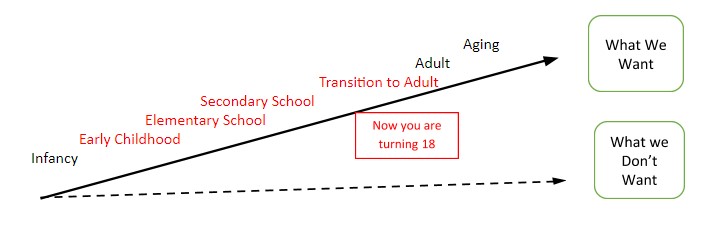
-
Educational Planning
Educational Planning for students projected to attend post-secondary education (College, Trade School or Military)
Checklist for Transition Planning
Resources for Educational Planning:
Pacer’s National Parent Center on Transition and Employment
Students with Disabilities Preparing for Postsecondary Education from the US Office of Civil Rights
Lexile levels for postsecondary education
Develop Good Habits (Study Schedule)
-
Self Determination and Self-Advocacy
Self Determination and Self-Advocacy
Self-advocacy is the ability to speak up for yourself and the things that are important to you. It includes asking for the things you want and need and express your feelings and ideas. Self-determination means that the person recognizes their strengths and needs in order to determine a goal, create and evaluate a plan of action while using identified supports. Self-determination can be expressed at all ages and in many ways. A young child shows self-determination by choosing a toy, a shirt to wear, or a snack. This can be expressed by crying and throwing themselves on the floor or by having a choice presented. The parent can help the child by teaching self-determination and decreasing the emotional outbursts.
Skills associated with self-determination include choice making, self-advocacy and self-management and having self-awareness and self-knowledge.
Click HERE to view skills associated with Self Determination and Self-Advocacy.
-
Agency Supports
Agency Supports List
-
Healthcare Transition
Healthcare Transition
Healthcare transition is the process of getting ready for healthcare as an adult. During childhood, parents usually help with medical needs—they call for appointments, fill out forms, and keep track of medications. As youth get older, managing medical needs becomes their own responsibility. Achieving this independence requires an organized transition process to gain independent healthcare skills, prepare for an adult model of care, and transfer to new providers. There are several steps you can take to make sure the transition to adult healthcare goes smoothly. Be sure to also check out our resource section for additional information.
-
Maximizing Supplemental Security Income
-
Planning for the Future with Medicaid Waivers
-
Sample Trajectories
Secondary College Outcome Trajectory
Sample Trajectories (Early Childhood, Elementary, Secondary, Secondary/College) HTML version



